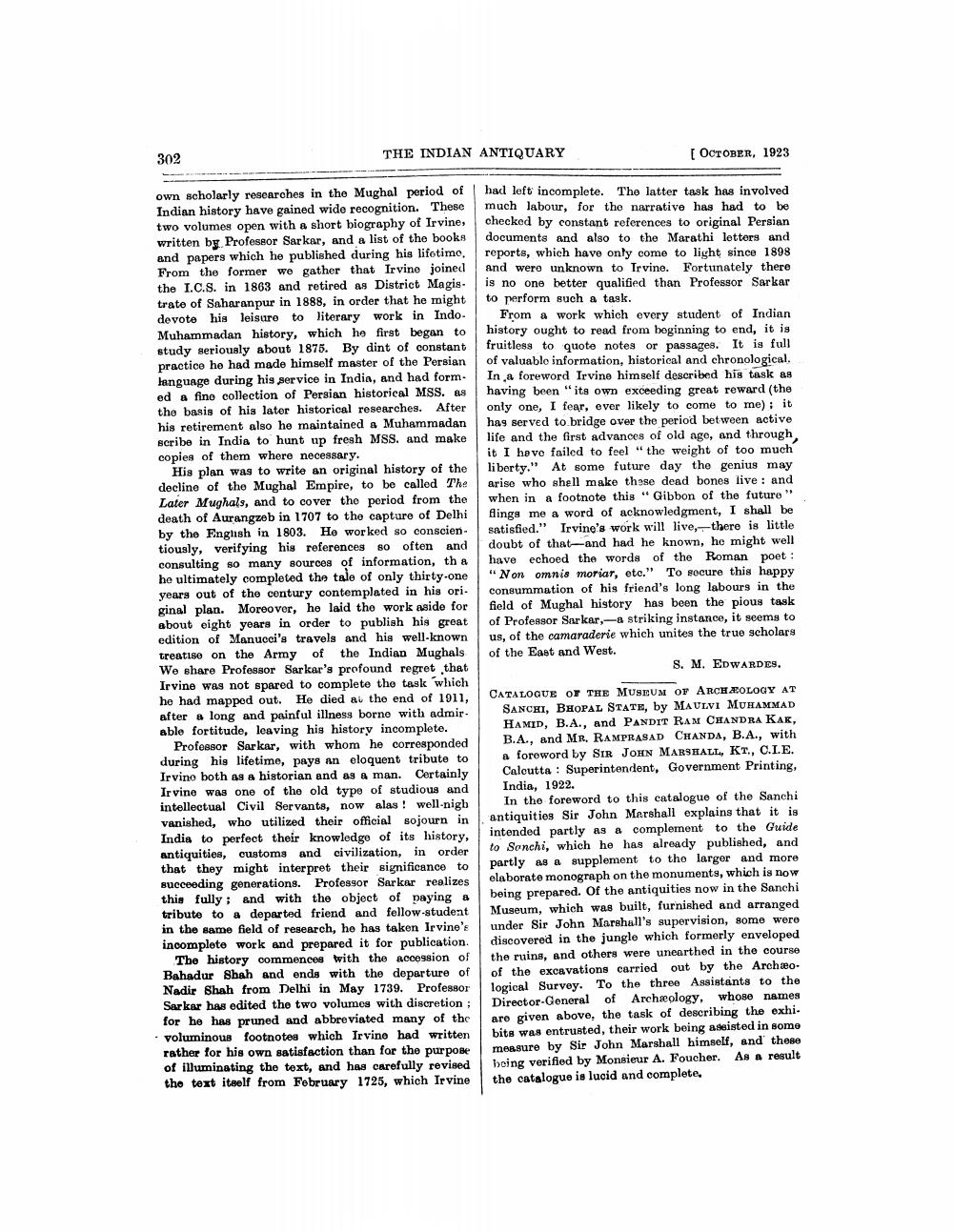________________
302
THE INDIAN ANTIQUARY
[ OCTOBER, 1923
own scholarly researches in the Mughal period of Indian history have gained wide recognition. These two volumes open with a short biography of Irvine, written by Professor Sarkar, and a list of the books and papers which he published during his lifetimo. From the former we gather that Irvine joined the I.C.S. in 1863 and retired as District Magis. trato of Saharanpur in 1888, in order that he might devoto his leisure to literary work in Indo. Muhammadan history, which he first began to study seriously about 1875. By dint of constant practice he had made himself master of the Persian language during his service in India, and had form. ed a fino collection of Persian historical MSS. 89 the basis of his later historical researches. After his retirement also ho maintained Muhammadan scribe in India to hunt up fresh MSS. and make copies of them where necessary.
His plan was to write an original history of the decline of the Mughal Empire, to be called The Later Mughals, and to cover the period from the death of Aurangzeb in 1707 to the capture of Delhi by the English in 1803. Ho worked so conscientiously, verifying his references 80 often and consulting so many sources of information, tha he ultimately completed the tale of only thirty-one years out of the century contemplated in his ori. ginal plan. Moreover, he laid the work aside for about eight years in order to publish his great edition of Manucci's travels and his well-known treatise on the Army of the Indian Mughals We share Professor Sarkar's profound regret that Irvine was not spared to complete the task which he had mapped out. He died at the end of 1911, after a long and painful illness borne with admir. able fortitude, leaving his history incompleto.
Profesor Sarkar, with whom he corresponded during his lifetime, pays an eloquent tribute to Irvino both as a historian and as a man. Certainly Ir vine was one of the old type of studious and intellectual Civil Servants, now alas! well-nigh vanished, who utilized their official sojourn in India to perfect their knowledge of its history, antiquities, customs and civilization, in order that they might interpret their significance to succeeding generations. Professor Sarker realizes this fully; and with the object of paying a tribute to a departed friend and fellow-student in the same field of research, he has taken Irvine's incomplete work and prepared it for publication.
The history commences with the accession of Bahadur Shah and ends with the departure of Nadir Shah from Delhi in May 1739. Professor Sarkar has edited the two volumes with discretion : for he has pruned and abbreviated many of the · voluminous footnotes which Irvino had written rather for his own satisfaction than for the purpose of illuminating the text, and has carefully revised the text iteelf from February 1725, which Irvine
had left incomplete. The latter task has involved much labour, for the narrative has had to be checked by constant references to original Persian documents and also to the Marathi letters and reports, which have only come to light since 1898 and were unknown to Irvine. Fortunately there is no one better qualified than Professor Sarkar to perform such a task.
From a work which every student of Indian history ought to read from beginning to end, it is fruitless to quote notes or passages. It is full of valuable information, historical and chronological. In a foreword Irvine himself described his task as having been its own exceeding great reward (the only one, I fear, ever likely to come to me): it has served to bridge over the period between active life and the first advances of old age, and through it I heve failed to feel "the weight of too much liberty." At some future day the genius may arise who shell make these dead bones live : and when in a footnote this " Gibbon of the future" flinge me a word of acknowledgment, I shall be satisfied." Irvine's work will live, there is little doubt of that-and had he known, he might well have echoed the words of the Roman poet: "Non omnis moriar, etc." To socure this happy consummation of his friend's long labours in the field of Mughal history has been the pious task of Professor Sarkar,-a striking instance, it seems to us, of the camaraderie which unites the true scholars of the East and West.
S. M. EDWARDES.
CATALOGUE OF THE MUSEUM OF ARCHAEOLOGY AT
SANCHI, BHOPAL STATE, by MAULVI MUHAMMAD HAMID, B.A., and PANDIT RAM CHANDRA KAE, B.A., and MR. RAMPRASAD CHANDA, B.A., with a foreword by SIR JOHN MARSHALL, KT., C.L.E. Calcutta : Superintendent, Government Printing, India, 1922.
In the foreword to this catalogue of the Sanchi antiquities Sir John Marshall explains that it is intended partly as a complement to the Guide to Sonchi, which he has already published, and partly as a supplement to the larger and more elaborate monograph on the monuments, which is now being prepared. Of the antiquities now in the Sanchi Museum, which was built, furnished and arranged under Sir John Marshall's supervision, some were discovered in the jungle which formerly enveloped the ruins, and others were unearthed in the course of the excavations carried out by the Archæological Survey. To the three Assistants to the Director-General of Archæology, whose names are given above, the task of describing the exhi. bits was entrusted, their work being assisted in some measure by Sir John Marshall himself, and these boing verified by Monsieur A. Foucher. As a result the catalogue is lucid and complete




